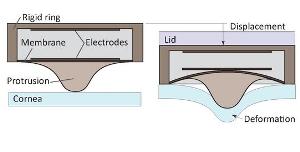Researchers at EPFL have collaborated with Haute Ecole Arc to develop a novel smart contact lens that can help identify glaucoma at the early stages. Tissot Medical Research (TMR), an EPFL startup, had commissioned the research team to design a single-use contact lens that can measure intraocular pressure for 24 hours constantly.

Glaucoma is invisible. It occurs due to excessive pressure in the eye and may damage the optical nerve, leading to blindness.
Painless and invisible, this insidious disease is often detected too late by doctors, once the optic nerve has already been damaged.
Presently, the Goldmann Applanation Tonometry technique is used for measuring the pressure in the eye. It involves application of a specific type of cone whose tip is placed flatly against the eye’s cornea. This provides accurate measurement of the intraocular pressure. However, this testing can only be done in clinics or hospitals. Usually, abnormal intraocular pressure occurs in the early hours of the day or at night, during which medical personnel will not be available for consultation.
The Lens
The lens is manufactured from silicon and each lens has a protuberance. Every time the eye blinks, the protuberance puts pressure against the cornea. Electrodes are used to form a capacitive sensor in a rigid ring in the protuberance. These electrodes come closer when the eyelid closes. The intraocular pressure rate is derived from the extent between the electrodes.
The data captured by the lens is sent through antennas in patient's glasses to a small, portable box. The ESPLAB’s Director, Pierre-André Farine, stated that the data could be accessed by ophthalmologists by plugging-in through a USB port on the box. The data could also be sent directly to smartphones, he said.
References